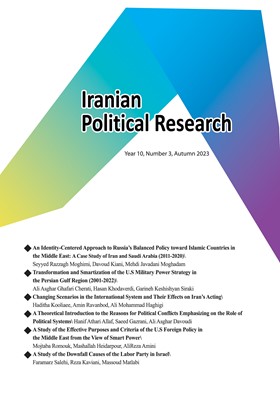Changing Scenarios in the International System and Their Effects on Iran’s Acting
Subject Areas : Iranian Political Research
Hadiseh Koliaee
1
![]() ,
Amin Ravanbod
2
*
,
Amin Ravanbod
2
*
![]() ,
AliMohammad Haghighi
3
,
AliMohammad Haghighi
3
1 - Ph.D., Department of Political Science, Lamerd Branch, Islamic Azad University, Lamerd, Iran.
2 - Assistant Professor, Department of Political Science, Lamerd Branch, Islamic Azad University, Lamerd, Iran
3 - Assistant Professor, Department of Political Science, Lamerd Branch, Islamic Azad University, Lamerd, Iran
Keywords: Futurology, Foreign policy, Multipolar World, International system, U.S, China, Islamic Republic of Iran,
Abstract :
The purpose of the present study is to identify likely structures for the future international system and to understand their effectiveness on Iran’s opportunities and limitations. The methodology of the present research is qualitative that has used a futurologist scenario to identify likely structures of the international system. The main research question is: what are scenarios that can change the international system and what will be their consequences and effects on Iran’s relations and acting? The research results show that the occurrence of the scenario of a multipolar international system is more likely than a bipolar or unipolar one. In each scenario, countries have 3 general options: companionship including union or following, competition including creating balance, tolerating the challengers, and adopting an opposition policy towards the existing pole or poles in the world. The scenario of a multipolar world will bring the most capabilities and opportunities for Iran while the unipolar scenario led by the U.S will increase Iran’s limitations. On the other hand, the bipolar scenario compared to the unipolar one led by the U.S enhances Iran’s opportunities. Iran’s membership in the Shanghai Cooperation Organization will assist Iran to create more opportunities to meet its national interests through the bipolar scenario revolving around the U.S and China.
جهانبین، فرزاد (1395). جمهوری اسلامی ایران و ایفای نقش در نظام چندقطبی آینده (فرصتها و چالشها). پژوهشنامه انقلاب اسلامی، 6(20)، ص99-77.
جهانبین، فرزاد؛ پرتو، فتحالله (1394). سناریوهای آینده نظام بینالملل و جایگاه جهان اسلام. پژوهشهای راهبردی سیاست، 4(13)، ص168-147.
حافظنیا، محمدرضا (1377). مقدمهای بر روش تحقیق در علوم انسانی. تهران: انتشارات سمت.
حسینی متین، سید مهدی (1390). ساختار نظام بینالملل تکقطبی و تاثیر آن بر سیاست خارجی (با نگاهی به نقش امریکا پس از جنگ سرد). سیاست، 41(2)، ص123-107.
دهشیری، محمدرضا؛ گلستان، مسلم (1395). الگوی رفتاری قدرتهای بزرگ در مدیریت بحرانهای بینالمللی در نظام تک چند قطبی. پژوهشنامه علوم سیاسی، شماره 3.
دهقانی فیروزآبادی، جلال (1399). نظم بینالمللی پساکرونا: چیستی و چگونگی- به زودی شاهد دنیایی کاملاً متفاوت خواهیم بود. دیپلماسی ایرانی. قابل دسترس در: http://www.irdiplomacy.ir/fa/news/1991184
دیلمی معزی، امین؛ رفیع، حسین (1388). روندهای کلان نظام بینالملل در آغاز هزاره سوم. تحقیقات سیاسی و بینالمللی، 1(4).
سیمبر، رضا و قربانی شیخنشین، ارسلان (1399) «عناصر و روندهای موثر بر نظام بین الملل»، پژوهش سیاست نظری، شماره 9.
ظریف، محمدجواد؛ سجادپور، محمدکاظم؛ مولایی، عباداله (1396). دوران گذار روابط بینالملل در جهان پساغربی. تهران: انتشارات وزارت امور خارجه.
محمدخانی، علیرضا (1388). تبیین رویکرد نوواقعگرایی در روابط بینالملل. مطالعات سیاسی، شماره 3.
یزدانی، عنایتاله؛ طالعی حور، رهبر؛ بهرامی، رستم (1396). نقش روسیه و چین در گذار نظام بینالملل از تکقطبی به چند قطبی. مطالعات سیاسی، 9(36)، ص90-65.
Boulding, K.E. (1958). Theoretical Systems and Political Realities: A Review of Morton A. Kaplan, System and process in International Politics. Journal of Conflict Resolution,
No. 2, p. 329.
Champion, M. & Leung, A. (2018). Does China Have What It Takes to Be a Superpower? Bloomberg, August, No.30.
Kaplan, M.A. (1957). System and Process in International Politics. ECPR press.
Liberthal, K. (1995). A New China Strategy. Foreign Affairs, 74(6), p. 34-49.
Lundborg, T. (2019) The ethics of neorealism: Waltz and the time of international life. European Journal of International Relations, 25(1), p.229-249.
Morrison, W.M. (2019). China’s Economic Rise: History, Trends, Challenges, and the Implications for the United States. Congressional Research Service.
Available at http://fas.org/sgp/crs/row/RL33543.pdf
Palmer, G. (2009). Maxim, Neorealism and Iran’s Security Environment.
URL= https://ir.canterbury.ac.nz/handle/10092/4258
Perlez, J. & Huang, Y. (13 May 2017). Behind China’s $1 Trillion Plan to Shake up the Economic Order. New York Times.
Ritchie, J. & Lewis, J. (2003). Qualitative Research Practice. London: Sage Publications.
Schofield, I. (2019). Does neo-realism present a credible account of global governance? Available at: https:// researchgate.net/publication/331498848_Does_neo-
realism_present_a_credible_account_of_global_governance
Waltz, K.N. (1979). Theory of International Politics. Reading, Mass: Addison-Wesley Pub.Co.
Waltz, K.N. (1993). The Emerging System of International Politics. International Security, 18(2), p. 44-79.
_||_

